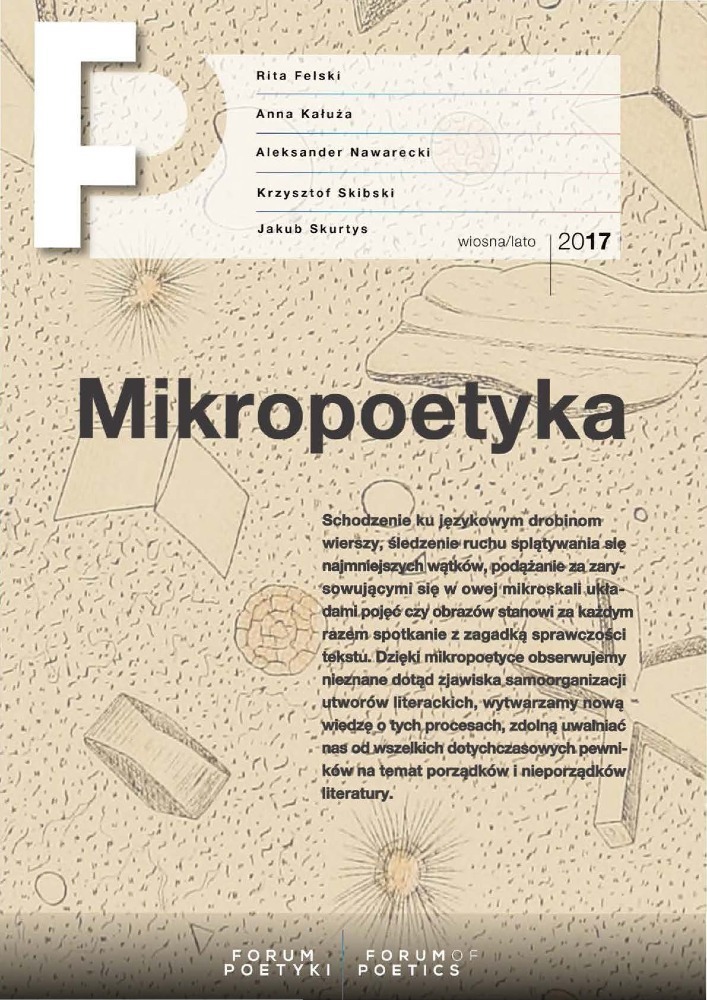Abstrakt
Niniejszy artykuł czerpie z prac Bruno Latoura, aby zakwestionować konwencjonalne metody „historycyzacji” i „kontekstualizacji” dzieł sztuki. Zwyczajowo za kontekst uznaje się oryginalny kontekst historyczny, a akt historycyzacji tekstu polega na połączeniu go z innymi tekstami i zdarzeniami wewnątrz tego samego odcinka czasu. W artykule przekonuję, że takie podejście historystyczne nie jest w stanie wyjaśnić transtemporalnych ruchów tekstów, ich zdolności do rezonowania w różnych okresach i sposobów, na jakie do nas dzisiaj przemawiają. Co więcej, tradycyjne modele kontekstu i jego korelatów (społeczeństwa, władzy, ideologii, itp.) zwykle pomniejszają lub jawnie negują sprawczość dzieł sztuki. Co by się stało, gdybyśmy pomyśleli o owych dziełach jako pozaludzkich aktorach, którzy zmieniają aktualną sytuację, wprowadzając różnicę? Takie podejście wymaga od nas rozpoznania specyfiki dzieł sztuki oraz ich towarzyskości i światowości. Dzieła sztuki nie są heroicznymi aktorami zaangażowanymi w nieskończony sprzeciw, subwersję i opór; są raczej współzależnymi współaktorami zanurzonymi w sieć różnorodnych załączników i powiązań, które pozwalają im przetrwać.
Bibliografia
Benett, Tony. „Texts in History: The Determination of Readings and Their Texts”. The Journal of the Midwest Modern Language Association 18, nr 1 (1985): 1–16.
Bennett, Tony, i Janet Woollacott. Bond and beyond: The Political Career of a Popular Hero. London: Macmillan Education, 1987.
Bowen, John. „Time for Victorian Studies?” Journal of Victorian Culture, nr 2 (2009): 282–93.
Bruns, Cristina Vischer. Why Literature? The Value of Literary Reading and What It Means for Teaching. New York: Bloomsbury Academic, 2011.
Cohen, Ed. „Confessions of a Pseudo-Victorianist, or How I Fell Ass-Backwards and Landed in a Period (A Screed)”. Victorian Literature and Culture 27, nr 2 (1999): 487–94.
Cohen, Jeffrey Jerome. Medieval Identity Machines. Minneapolis: University of Minnesota Press, 2003.
Dinshaw, Carolyn. „Theorizing Queer Temporalities: A Roundtable Discussion”. GLQ, nr 2–3 (2007): 177–95.
Eduardo De La Fuente. „The Artwork Made Me Do It: Introduction to the New Sociology of Art”. Thesis Eleven 103, nr 1 (2010): 3–9.
Felski, Rita. „Suspicious Minds”. Poetics Today, nr 2 (2011): 215–34.
Fleissner, Jennifer. „Is Feminism a Historicism?” Tulsa Studies in Women’s Literature 21, nr 1 (2002): 45–66.
Gell, Alfred. Art and Agency: An Anthropological Theory. Oxford: Clarendon Press, 2013.
Goldberg, Jonathan. „Queering History”. PMLA, nr 5 (2005): 1608–17.
Goodlad, Lauren. „Trollopian «Foreign Policy»: Rootedness and Cosmopolitanism in the Mid-Victorian Global Imaginary”. PMLA 124, nr 2 (2009): 437–54.
Grady, Hugh, i Terence Hawkes. Presentist Shakespeares. London; New York: Routledge, 2007.
Grossberg, Lawrence. Bringing It All Back Home Essays on Cultural Studies. Durham, NC: Duke University Press, 1997.
Harris, Jonathan Gil. Untimely Matter in the Time of Shakespeare. Philadelphia, Pa.; Oxford: University of Pennsylvania Press : Oxford Creative Marketing [distributor, 2011.
Karl Heinz Bohrer, Sean Nye, i Rita Felski. „The Tragic: A Question of Art, Not Philosophy of History”. New Literary History New Literary History 41, nr 1 (2010): 35–51.
Latour, Bruno. Nigdy nie byliśmy nowocześni: studium z antropologii symetrycznej. Przetłumaczone przez Maciej Gdula. Warszawa: Oficyna Naukowa, 2011.
Latour, Bruno. Splatając na nowo to, co społeczne: wprowadzenie do teorii aktora-sieci. Przetłumaczone przez Krzysztof Abriszewski i Aleksandra Derra. Kraków: Universitas, 2010.
Moretti, Franco. „The Slaughterhouse of Literature”. Modern Language Quarterly 61, nr 1 (2000): 207–28.
Summit, J, i D Wallace. „Rethinking Periodization”. The Journal of Medieval and Early Modern Studies. 37, nr 3 (2007): 447–52.
Wai Chee Dimock. „A Theory of Resonance”. PMLA 112, nr 5 (1997): 1060–71
Licencja
Za prawa cytowania fragmentów innych publikacji (tekstów, tabel, rycin oraz ilustracji) odpowiedzialni są autorzy artykułu.

